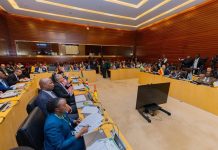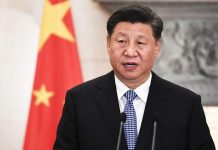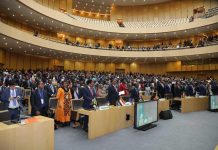
Africa-Press – Mauritius. We learn that you are going to release a fifth book towards the end of this year, a book which will deal with the events that occurred during the years ’82 to ’95, that is to say during a period spread over 13 years.
‘Political Passions’, the previous book, had taken a look at the years 1968-82, i. e. 14 years.
Does this mean that political history in Mauritius is constructed and deconstructed as quickly as that – every 13 to 15 years – and not 30-40 years, as one would have thought?
Jean-Claude de l’Estrac: Not exactly! I am more in a chronological logic. But we can indeed find in our political history these short phases of deconstruction, reconstruction with, alas, the same actors for 50 years.
But the real issue is not that it happens with the same political parties. This is the case in most countries in the democratic area. Political parties are long-lasting institutions.
Some of those in power today in the world are more than a century old. Here in Mauritius, we can consider that our parties are very young organizations.
And precisely my next work which covers the period ’82 to ’95 reports on the emergence of the new party of Anerood Jugnauth, the Militant Socialist Movement (MSM).
What horrifies a certain number of voters, young people in particular, is not so much the permanence of the parties, as a form of fossilization in the leadership of these parties.
No matter their achievements, no matter their failures, no matter their failings, once a leader always a leader! It is like this in all our political parties.
This is what distances us from the practices in more mature democracies, their leaders are not irremovable, they are ejected or they bow out when they produce failures.
* If the years 1968-82 were also, beyond the phase devoted to “learning independence”, “the time of intrigues.
the time when the figures who would shape the personality of the country emerged”, like you describe it in the preface of ‘Political Passions’, what about 1982 to ’95? What lessons do you draw from this tumultuous period?
You invite me to exegete my forthcoming book, I cannot do it… Especially since I postulate, like the historian Quitilianus, that history is written to tell and not not to prove.
That said, the story of these 13 years is indeed very rich: they have seen the rise of Anerood Jugnauth, once out of the shadow of Bérenger, the creation of the MSM, two splits in the MMM, the return of Labour, the long governance of Jugnauth, spectacular on the economic level, mixed on the social level.
And then its largely predictable fall in the 1995 elections. I did not have to personally learn from it, the facts are extremely telling. And the figures of this period, which are largely those of today, become even more legible with the prism of time.
The reader will learn his own lesson. ‘ Tell us anyway: is this also the extension of what was initiated during the previous period on the political level with the establishment of a counter-power against the labor regime and are we already seeing the beginning of its deconstruction? ?
We are not at the establishment of “counter-power” when we do not even know what will be the “power”. Very smart one who can already announce what will happen in the next elections. I continue to think that the force of circumstances could push for a beneficial cleansing of our political practices.
Let me explain: if the political leaders of the traditional parties are humanely and normally constituted, new alliances between them are unimaginable if we trust what they say, or have said, about each other.
I will be told that they have done so in the past. I just think that they have now exhausted the scenario, the large traditional parties will be forced to align themselves with one or more small support parties. I exclude, for political hygiene, an MMM-MSM remake or an MMM-PTr alliance.
* We see Paul Bérenger once again become “the undisputed and indisputable leader” of the Mauves following the election of the central committee of the MMM, last Sunday – despite seven consecutive defeats under his leadership.
What does this really mean, in your opinion? Why “become again”? Bérenger always has been. I told you, once a leader always a leader. There is an explanation for this: if we want to be indulgent, we will point out that Bérenger is an eminently charismatic leader, and that in the eyes of his supporters, he is irreplaceable.
It is indeed thanks to the episodic purges which are today one of the hallmarks of the MMM. Bérenger is always “uncontested and indisputable”, because the leader does not tolerate protesters! They all left or were expelled.
His hold on the “party” is total. Change, when it happens, will not come from within, it will be imposed by the electorate. The partial Quatre-Bornes is a warning shot that was ignored, it will not be the same in the legislative elections.
* There is also the case of Madan Dulloo, who, it is said, could enjoy a “meteoric rise” within the MMM, and the remarkable performance of Reza Uteem and Aadil Ameer Meea.
Do you see there, beyond ethnic considerations or even ethnic guarantees, signs of the reestablishment of an MMM as desired by grassroots activists for many years?
Dulloo is a species of phoenix that keeps rising from its ashes. He was buried, at different times, by each of the leaders of the major parties. He always lands on his feet, he must have a pedigree that makes him a must.
. But I wouldn’t call it a “lightning rise”. I think he was served by the circumstances, in particular the expulsion of Pradeep Jeeha.
He is Bérenger’s stepney, but depending on the MMM’s next electoral strategy, we could hear a lot about him. Besides, I’m not surprised by the performance of Uteem and Meea.
* The inclusion of relatives of the MMM leader, however, gives the image of a party in the process of joining the ranks of other traditional parties where kinship ties take precedence over other considerations.
“The activists have voted,” Ajay Gunness simply declared to a daily newspaper as if to respond to the criticisms that this will raise. How do you react to this? No, it is not about “inclusion”. Berenger’s relatives ran for elections, they were elected.
It is possible that the militant-voters had a sentimental consideration for the parents of Bérenger who militate in the authorities of the party, why not? This is why I found nothing wrong with the succession to the MSM from the moment that the members of this party had chosen to make Pravind their leader.
It was on this day that he became Prime Minister. Leader of the main party in the National Assembly, it goes without saying that he inherits the post of Prime Minister. A dispute would have been legitimate at the time of the choice of the leader, there was none at the MSM.
We can understand that the MMM, just like the PTr and the PMSD, no longer has, as in the past, executives united around a political program, but that gives the impression that we are moving more towards a fragmentation politics for the benefit of a few families, isn’t it?
That’s a big exaggeration. First let us note that in many sectors, we see family traditions being perpetuated, which from father to son or daughter, ensure the transmission of knowledge and values.
There are families of doctors, lawyers, artists, journalists – yourself, dear friend. The intolerable comes when the power given to one is used to offer those close to them undue advantages, to the detriment of the average citizen.
Mauritians have a holy horror of this kind of injustice. This government does not seem to have learned the lesson. As far as the programs are concerned, one can consider that Pravind Jugnauth’s approach as expressed in the measures of his various budgets represents a programmatic proposal.
We can summarily qualify it as social-liberal. But this is not a distinctive mark, our three or four traditional parties all belong to this school. That is why, in the next elections, the choice will not be made on the basis of the programs, they have the same, it will once again be a war of people.
* As if to sum up the current state of affairs, the leader of the Patriotic Movement, Alan Ganoo, came to declare at the anniversary congress of his party that “today no one can say who will be the next Prime Minister.
On the other hand, what seems likely to me, the current tenant will not be in charge. » Do you share this opinion? Why ? There is a contradiction in his words; he says no one knows who the next prime minister will be, but he knows the current one won’t.
It is the first part of his statement that is correct, no one knows indeed. What the second part of his comment indicates is because Ganoo imagines himself as a partner of Navin Ramgoolam, he thinks that Ramgoolam will be the next Prime Minister. I don’t believe he is thinking of Berenger or himself.
* Pravind Jugnauth applies himself at the level of the government and in the political field to restore the image of what remains of the Lepep Alliance; he seems to have managed to emerge from the shadow of Sir Anerood Jugnauth, and he has just presented, still according to Alan Ganoo, a budget although “irresponsible, but intelligent” politically.
It takes a lot more to win, you say? You are right, Pravind Jugnauth is asserting himself more and more. He has definitely freed himself from the heavy tutelage of his father.
His words are coherent, his priorities seem right, he is focused on modernizing the country’s infrastructure, the basis for future growth, he seems to understand the urgent need to open up the country more, he is a rational finance minister who keeps one eye on politics – two eyes I think…
This is not bad in itself if the ultimate objective is to relieve the poorest and combat economic inequalities. Several recent measures go in this direction.
Economic statistics indicate that this social concern is also good economic policy. But Pravind Jugnauth remains a prisoner of an old political scheme, there are too many “mo dimoun” around him.
Some are up to it, others do him great harm in public opinion. If we rely on the experience of the past, we know that good economic results are not enough to mobilize the votes of voters.
Is the passport and nationality affair as irresponsible as people say? Absolutely not. Today in the world there are nearly a hundred countries that have preceded us, including European countries such as Austria, Bulgaria, Malta and Cyprus.
But in general they are small islands like ours. To attract the big fortunes of the world in return for the security of an honorable nationality and an uneventful passport, allowing free travel in a very large number of countries, all kinds of frameworks have been developed.
In St Kits and Nevis, a small Caribbean island of less than 60,000 inhabitants, where the program has existed since 1984, it is possible, for example, to invest in the sugar industry, a Sugar Industry Diversification Fund, to obtain the nationality.
It is not rocket science what the minister proposed, the countries which do it show an improvement in their growth rate. For nearly three decades, after Independence, this is what we did, especially with Hong Kongers, to launch the textile industry.
Naturally, the country has every interest in verifying the profile and background of applicants to protect the good reputation of the destination and the greatest transparency on the eligibility criteria.
* But it will be enough for the MSM however to contract a good alliance with the MMM to give itself the best chances during the next legislative elections. What do you think would bring Paul Bérenger to be ready for a new alliance with the MSM?
You forget the disappointment of 2014? The discovery that in politics 1+1 can give 0! Bérenger will think twice, but I bet he will be under strong pressure from a number of apparatchiks who believe they can save their skins in a certain number of constituencies.
* What will become of the Labor Party if a “remake” of the MMM-MSM alliance manages to win the trust of a majority of voters?
Very hypothetical! If that happens, Ramgoolam will say that the elections were rigged, and he will go back to London, if he can. . . * What if Labor wins? This time, it’s the Jugnauths who will think about packing their bags. It’s hard not to imagine a backlash. ..
For More News And Analysis About Mauritius Follow Africa-Press






